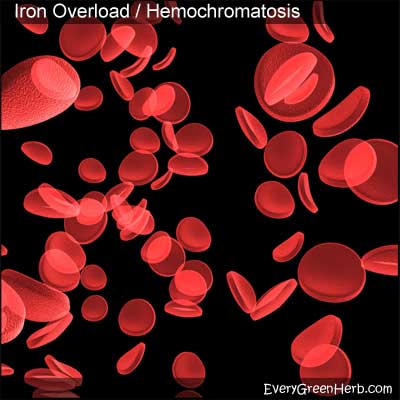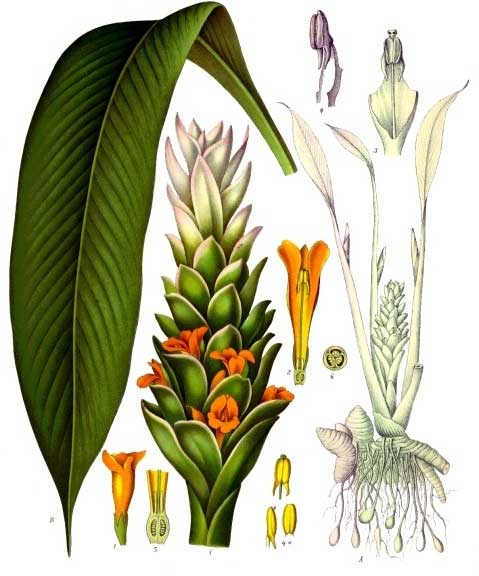Herbs for iron overload
Red blood cells can absorb too much iron from the foods we eat. This dangerous condition is known as iron overload or hemochromatosis.

Excess iron is stored in our organs, especially our livers, hearts, and pancreases. This over abundance of iron can poison muscles and organs, leading to life-threatening conditions such as cancer, heart arrhythmias, and cirrhosis.
Fighting iron overload with herbs
Rosemary and ginkgo biloba can help regulate iron levels.
Dandelion and milk thistle seed help protect the liver from damage.
Astragalus and ginseng can help keep the immune system healthy so it can fight off the effects of too much iron.
If your iron levels get too high, you will need to see a professional. They will do a phlebotomy, which is like any blood donation (except they throw your blood away).
Giving blood to Red Cross regularly help keep a person's iron levels under control. In women, menstruation usually takes care of it.
If iron levels get too high, schedule a blood donation or see a doctor to have blood removed. You do not want high iron levels to stay in your body for too long, or to turn into full-blown hemochromatosis!

Hemochromatosis can be inherited.
Some people inherit a faulty gene that causes hemochromatosis.
In middle age, hemochromatosis is more likely to be serious in men.
Women are more likely to develop serious symptoms after menopause, when they no longer lose iron with menstruation and pregnancy.
Symptoms often appear in midlife.
Signs and symptoms of hereditary hemochromatosis usually appear in midlife. Symptoms include joint pain, fatigue, weakness, dizziness, poor skin color (grayish tint), depression, loss of sex drive, liver problems, pancreas abnormalities, enlarged spleen, and heart palpitations.
Other related issues include diabetes, infertility, impotence, hypothyroidism, and some cancers.

Use turmeric / curcumin to help fight iron overload.
It is thought that turmeric, which contains curcumin, can help remove iron from the blood.
Turmeric is a wonderful spice to keep in the kitchen. The health benefits of turmeric are numerous and include lowering bad cholesterol levels. Turmeric is one herb I like to keep handy!
Giving blood can help lower iron levels.
Iron can be usually be kept at safe levels by regularly removing blood from the body through blood donations. If you are healthy or have high iron, give regularly!
Once hemochromatosis is diagnosed, blood donation might not be an option, since it is considered a blood disorder. Currently, places like the Red Cross do not accept blood from people with blood disorders. In this case, you will have to have blood removed by a physician to lower your iron.
Many people might benefit from receiving iron rich blood, but for now, when blood is removed from anyone with hemochromatosis, it is considered hazardous material. What a waste!
High iron and sleep apnea
People with an excess of red blood cells may also show high iron levels when tested. An excess of red blood cells can be caused by sleep apnea.
Sleep apnea is when a person quits breathing for short periods while sleeping. People with sleep apnea produce extra red blood cells because when they quit breathing, the body is starved for oxygen. Producing more red blood becomes the body's temporary fix and more red blood cells means higher iron in the body.
If you are overweight, snore, feel tired all the time, and have higher than normal iron levels, get tested for sleep apnea.
Natural remedies
Home remedies include avoiding iron supplements and multivitamins containing iron. Watch out for iron enriched cereals and other processed food.
Also, avoid taking vitamin C with iron rich foods since vitamin C helps the body absorb iron.
Instead drink tea or coffee to slow iron absorption. Drink tannin rich tea or coffee when eating iron rich foods like meat and greens. The tannins in tea and coffee decrease iron absorption!
Treating iron overload with diet
Diet should include lots of vegetables, fruits, grains, nuts, and seeds. Avoid red meat, sugar, and alcohol.
Venison, lamb, beef, liver, shrimp, and mussels contain high levels of iron. When eating meat, choose lean pork, chicken, and fish.

Hemochromatosis is like rusty metal traveling through your veins and arteries.
High iron levels in your body can be compared to the damaging effects of rust, eating away at tissue and organs.
High iron levels cause your body to produce more harmful free radicals than the immune system can handle.
If you are diagnosed with high iron, berries and colorful foods with lots of antioxidants should be a large part of your diet.
By the way, if you don't know what free radicals and antioxidants are, you might want to read my glossary for beginning and advanced herbalists.
Science, iron overload, and herbs
Alfalfa and leeks are shown to reduce iron and ferritin levels.
Alfalfa contains high levels of flavonoids, alkaloids, coumarins, terpenes, and sterols that provide huge antioxidant benefits.
Leeks are a rich source of vitamins and minerals. They also contain carotenoids, glycosides, phenols, and flavonoids. that help regulate everything from blood clotting to digestion.
Scientists are looking for ways to treat iron overload because current medications, such as iron chelating drugs, have many side effects and disadvantages.
Studies show that flavonoids may be the answer.
Flavonoids found in plants actually reduce iron deposition and inhibit harmful effects of peroxidation caused by iron overload.
Iron, which is an essential element in the body, is responsible for oxygen transport, DNA replication, and many other functions.
We get iron from the food we eat. It is absorbed by the digestive tract, delivered into the blood stream, and deposited into our cells and organs. Once we absorb iron, the body has no known ways of excreting the excess.
Extra iron stays around and causes all sorts of damage including cancer and premature aging. When excess iron is deposited in the joints, it causes osteoporosis and joint pain.
Flavonoids bind with excess iron, causing iron levels to decrease in blood serum. Plant flavonoids inhibit reactive oxygen stress, scavenge free radicals, and regulate iron homeostasis.
Why are scientists looking for new remedies? Plants are a lot less expensive than prescription drugs, and they don't have harmful side effects.
Experiments have provided evidence that flavonoids really do reduce the damage done by hemochromatosis.
Flavonoids in chamomile, cayenne, colorful berries, and red wine seem to be especially promising. If you have too much iron, consider a diet change. You body will thank you.
Hemochromatosis is not rare in a meat eating society.
Hemochromatosis can be overlooked by doctors who are concentrating on treatment of other diseases.
Many older doctors still believe what they learned in medical school, that hemochromatosis is rare and only happens in older men. This is no longer true.
High iron levels can be found in children, teens, male, female, and the elderly.
When hemochromatosis is discovered early and treated before organ damage occurs, a person can live a normal, healthy life. Any family physician is qualified to diagnose and prescribe treatment for a hemochromatosis patient, but you may have to ask them to test you for it.
The opposite of anemia
Hemochromatosis is the opposite of anemia. People with anemia don't have enough iron in their blood. Read more about treating anemia with herbal remedies.
*Always consult with a healthcare professional before taking any herbal remedy or iron supplement especially if you are pregnant, nursing, or taking other medications.
Sources:
https://www.ncbi.nlm.nih.gov/pmc/articles/PMC4803991/
https://www.ncbi.nlm.nih.gov/pmc/articles/PMC8287860/
Blessings to you and yours!
Thanks so much for reading my blog. Jan.

*Note - the information on this website has not been evaluated by the Food and Drug Administration.
© 2005-2024 website design and content by Janice Boling